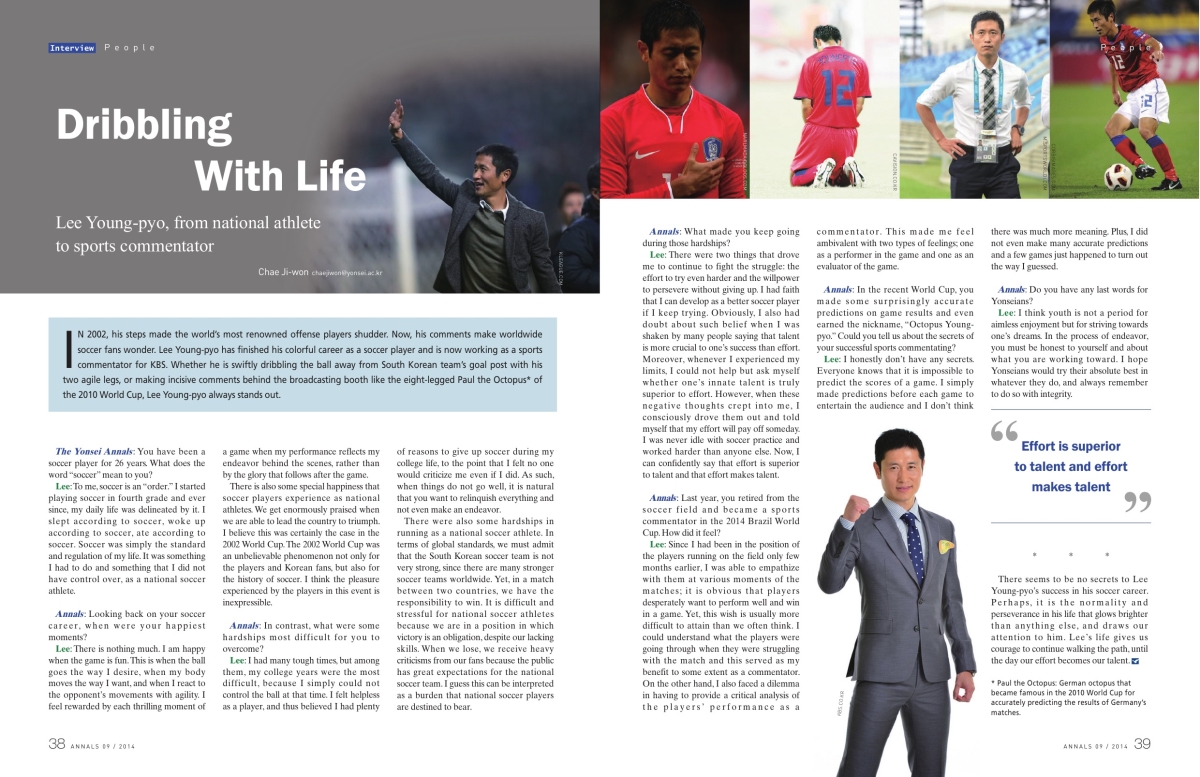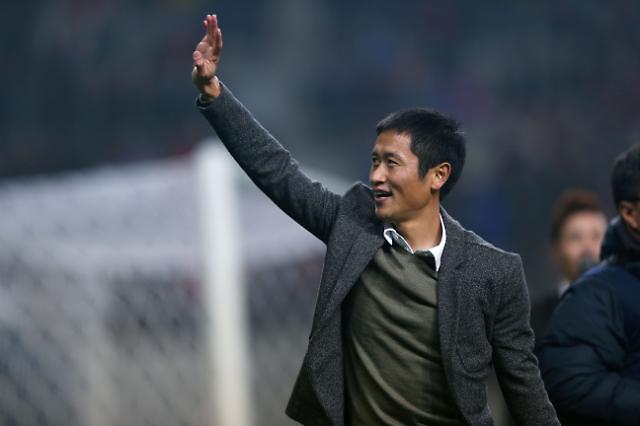Lee Young-pyo, from national athlete to sports commentator


IN 2002, his steps made the world’s most renowned offense players shudder. Now, his comments make worldwide soccer fans wonder. Lee Young-pyo has finished his colorful career as a soccer player and is now working as a sports commentator for KBS. Whether he is swiftly dribbling the ball away from South Korean team’s goal post with his two agile legs, or making incisive comments behind the broadcasting booth like the eight-legged Paul* the Octopus of the 2010 World Cup, Lee Young-pyo always stands out.
The Yonsei Annals: You have been a soccer player for 26 years. What does the word “soccer” mean to you?
Lee: To me, soccer is an “order.” I started playing soccer in fourth grade and ever since, my daily life was delineated by it. I slept according to soccer, woke up according to soccer, ate according to soccer. Soccer was simply the standard and regulation of my life. It was something I had to do and something that I did not have control over, as a national soccer athlete.
Annals: Looking back on your soccer career, when were your happiest moments?
Lee: There is nothing much. I am happy when the game is fun. This is when the ball goes the way I desire, when my body moves the way I want, and when I react to the opponent’s movements with agility. I feel rewarded by each thrilling moment of a game when my performance reflects my endeavor behind the scenes, rather than by the glory that follows after the game.
There is also some special happiness that soccer players experience as national athletes. We get enormously praised when we are able to lead the country to triumph. I believe this was certainly the case in the 2002 World Cup. The 2002 World Cup was an unbelievable phenomenon not only for the players and Korean fans, but also for the history of soccer. I think the pleasure experienced by the players in this event is inexpressible.
Annals: In contrast, what were some hardships most difficult for you to overcome?
Lee: I had many tough times, but among them, my college years were the most difficult, because I simply could not control the ball at that time. I felt helpless as a player, and thus believed I had plenty of reasons to give up soccer during my college life, to the point that I felt no one would criticize me even if I did. As such, when things do not go well, it is natural that you want to relinquish everything and not even make an endeavor.
There were also some hardships in running as a national soccer athlete. In terms of global standards, we must admit that the South Korean soccer team is not very strong, since there are many stronger soccer teams worldwide. Yet, in a match between two countries, we have the responsibility to win. It is difficult and stressful for national soccer athletes because we are in a position in which victory is an obligation, despite our lacking skills. When we lose, we receive heavy criticisms from our fans because the public has great expectations for the national soccer team. I guess this can be interpreted as a burden that national soccer players are destined to bear.
Annals: What made you keep going during those hardships?
Lee: There were two things that drove me to continue to fight the struggle: the effort to try even harder and the willpower to persevere without giving up. I had faith that I can develop as a better soccer player if I keep trying. Obviously, I also had doubt about such belief when I was shaken by many people saying that talent is more crucial to one’s success than effort. Moreover, whenever I experienced my limits, I could not help but ask myself whether one’s innate talent is truly superior to effort. However, when these negative thoughts crept into me, I consciously drove them out and told myself that my effort will pay off someday. I was never idle with soccer practice and worked harder than anyone else. Now, I can confidently say that effort is superior to talent and that effort makes talent.
Annals: Last year, you retired from the soccer field and became a sports commentator in the 2014 Brazil World Cup. How did it feel?
Lee: Since I had been in the position of the players running on the field only few months earlier, I was able to empathize with them at various moments of the matches; it is obvious that players desperately want to perform well and win in a game. Yet, this wish is usually more difficult to attain than we often think. I could understand what the players were going through when they were struggling with the match and this served as my benefit to some extent as a commentator. On the other hand, I also faced a dilemma in having to provide a critical analysis of the players’ performance as a commentator. This made me feel ambivalent with two types of feelings; one as a performer in the game and one as an evaluator of the game.
Annals: In the recent World Cup, you made some surprisingly accurate predictions on game results and even earned the nickname, “Octopus Young-pyo.” Could you tell us about the secrets of your successful sports commentating?
Lee: I honestly don’t have any secrets. Everyone knows that it is impossible to predict the scores of a game. I simply made predictions before each game to entertain the audience and I don’t think there was much more meaning. Plus, I did not even make many accurate predictions and a few games just happened to turn out the way I guessed.
Annals: Do you have any last words for Yonseians?
Lee: I think youth is not a period for aimless enjoyment but for striving towards one’s dreams. In the process of endeavor, you must be honest to yourself and about what you are working toward. I hope Yonseians would try their absolute best in whatever they do, and always remember to do so with integrity.
* * *
There seems to be no secrets to Lee Young-pyo’s success in his soccer career. Perhaps, it is the normality and perseverance in his life that glows brighter than anything else, and draws our attention to him. Lee’s life gives us courage to continue walking the path, until the day our effort becomes our talent.
*Paul the Octopus: German octopus that became famous in the 2010 World Cup for accurately predicting the results of Germany’s matches.

